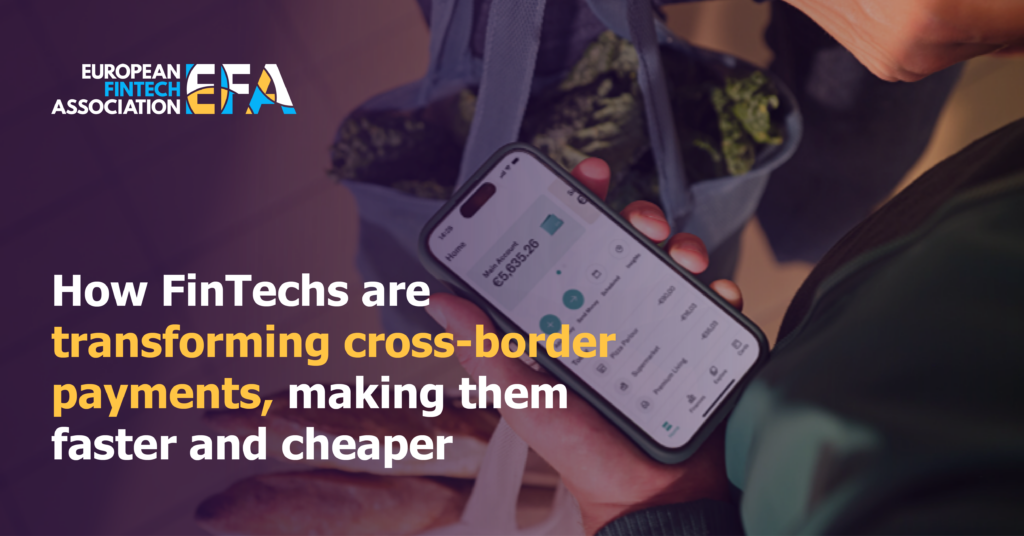
In today’s interconnected world, making cross-border payments easier and cheaper is more important than ever. More and more people lead international lives, including within the EU. Of the EU’s population, 9% or roughly 40 million people live in a different country to the one in which they were born.[1] And it’s not just people that are international – roughly half of Europe’s SMEs export goods and services outside of the Eurozone.[2]
While the adoption of digital payments has accelerated over the past few years, there are still significant inefficiencies in the way money moves across borders. For many, sending or spending money abroad remains a slow and costly process. FinTechs have been at the forefront of solving this problem and making cross-border payments more accessible, affordable and transparent.
Increasing competition, innovation and lowering prices for all
One of the biggest shifts in the payments landscape is seeing direct access to payment systems open up to more players. A privilege previously reserved mainly for traditional banks, the lack of non-bank access to paymentsystems limits competition and keeps costs high for consumers. With the adoption of the Instant Payments Regulation (IPR) in April 2024, the EU not only introduced mandatory instant payments in Euros across the EU, but also levelled the playing field by allowing non-banks, including FinTechs, to gain direct access to payment systems. This allows FinTechs to bypass traditional banking intermediaries, reducing the time and cost associated with facilitating payments, including cross-border transactions. The result? Faster, cheaper, and more reliable payments for consumers and businesses alike. By cutting out the middleman, FinTechs can offer services that are not only more efficient but also more customer-friendly and a new wave of innovative payment solutions can emerge, increasing competition.
Another crucial factor in increasing competition and lowering prices is transparency, which has been an area where FinTechs have been particularly disruptive. By ensuring full exchange rate disclosure, FinTechs have led the charge in empowering consumers and businesses to make informed decisions, particularly when it comes to the cost of making cross-border payments. In 2023, European consumers and businesses lost €30 billion to inflated rates when sending and spending money internationally.[3] Too often inflated exchange rates obscure the true cost of international transactions. While this lack of transparency prevents consumers and businesses from comparing options and choosing the best services, FinTechs and their approach are transforming this landscape by promoting transparency and building user trust.
Diversification of payment methods
The EU has been proactive in diversifying payment methods, largely driven by regulation. Regulatory initiatives such as the Payment Services Directive 2 (PSD2) and open banking have opened up access, enabling FinTechs to innovate and compete. The adoption of the IPR is set to further enhance this competitive landscape. The potential introduction of a Digital Euro could add more competition but it’s crucial that FinTechs can offer Digital Euro payment services to their customers, ensuring a level playing field.
EU regulatory initiatives should continue to foster a competitive environment within the EU where diverse payment players can thrive. This diversity is crucial for driving down costs and enhancing the quality of services available to consumers and businesses alike.
The Road Ahead
With FinTechs leading the charge, the payment landscape in the EU is becoming more dynamic and inclusive. Significant progress has been made, but there is always still more to be done to make cross-border payments cheaper, more inclusive, transparent, and efficient.
The EFA strongly supports the EU’s aim of a more innovative and competitive retail payments market and calls for the completion of the EU Digital Single Payments Market. The EU should work towards an innovative, competitive payments landscape, allowing consumers and businesses to benefit from new products and services, as well as more secure payments across the EU. This can be achieved through, for example, further harmonisation of the regulatory frameworks, introducing legislation that levels the playing field between banks and non-banks and full fee transparency, and by ending IBAN discrimination once and for all.
By harnessing the power of FinTech innovation, the EU can create a payment ecosystem that works for everyone, driving down costs, increasing transparency, and ensuring that cross-border transactions are as seamless as sending an email. As FinTech solutions are increasingly widely used by consumers and businesses across the EU, they should play a crucial role in shaping the rules that govern digital payment methods. This would help future-proof new and existing payment methods, facilitate their access for both consumers and businesses, and drive trust.
[1] https://ec.europa.eu/eurostat/web/products-eurostat-news/-/ddn-20220330-2
[2] https://www.ecb.europa.eu/press/economic-bulletin/focus/2019/html/ecb.ebbox201908_06~37a625c59f.en.html
